- Home
- E. M. Forster
The Longest Journey Page 18
The Longest Journey Read online
Page 18
They conversed and differed healthily upon other topics. A rifle corps was to be formed: she hoped that the boys would have proper uniforms, instead of shooting in their old clothes, as Mr. Jackson had suggested. There was Tewson; could nothing be done about him? He would slink away from the other prefects and go with boys of his own age. There was Lloyd: he would not learn the school anthem, saying that it hurt his throat. And above all there was Varden, who, to Rickie’s bewilderment, was now a member of Dunwood House.
“He had to go somewhere,” said Agnes. “Lucky for his mother that we had a vacancy.”
“Yes—but when I meet Mrs. Orr—I can’t help feeling ashamed.”
“Oh, Mrs. Orr! Who cares for her? Her teeth are drawn. If she chooses to insinuate that we planned it, let her. Hers was rank dishonesty. She attempted to set up a boarding-house.”
Mrs. Orr, who was quite rich, had attempted no such thing. She had taken the boy out of charity, and without a thought of being unconstitutional. But in had come this officious “Limpet” and upset the headmaster, and she was scolded, and Mrs. Varden was scolded, and Mr. Jackson was scolded, and the boy was scolded and placed with Mr. Pembroke, whom she revered less than any man in the world. Naturally enough, she considered it a further attempt of the authorities to snub the day-boys, for whose advantage the school had been founded. She and Mrs. Jackson discussed the subject at their tea-parties, and the latter lady was sure that no good, no good of any kind, would come to Dunwood House from such ill-gotten plunder.
“We say, ‘Let them talk,’ ” persisted Rickie, “but I never did like letting people talk. We are right and they are wrong, but I wish the thing could have been done more quietly. The headmaster does get so excited. He has given a gang of foolish people their opportunity. I don’t like being branded as the ‘day-boy’s foe,’ when I think how much I would have given to be a day-boy myself. My father found me a nuisance, and put me through the mill, and I can never forget it—particularly the evenings.”
“There’s very little bullying here,” said Agnes.
“There was very little bullying at my school. There was simply the atmosphere of unkindness, which no discipline can dispel. It’s not what people do to you, but what they mean, that hurts.”
“I don’t understand.”
“Physical pain doesn’t hurt—at least not what I call hurt—if a man hits you by accident or play. But just a little tap, when you know it comes from hatred, is too terrible. Boys do hate each other: I remember it, and see it again. They can make strong isolated friendships, but of general good-fellowship they haven’t a notion.”
“All I know is there’s very little bullying here.”
“You see, the notion of good-fellowship develops late: you can just see its beginning here among the prefects: up at Cambridge it flourishes amazingly. That’s why I pity people who don’t go up to Cambridge: not because a University is smart, but because those are the magic years, and—with luck—you see up there what you couldn’t see before and mayn’t ever see again.”
“Aren’t these the magic years?” the lady demanded.
He laughed and hit at her. “I’m getting somewhat involved. But hear me, O Agnes, for I am practical. I approve of our public schools. Long may they flourish. But I do not approve of the boarding-house system. It isn’t an inevitable adjunct—”
“Good gracious me!” she shrieked. “Have you gone mad?”
“Silence, madam. Don’t betray me to Herbert, or he’ll give us the sack. But seriously, what is the good of throwing boys so much together? Isn’t it building their lives on a wrong basis? They don’t understand each other. I wish they did, but they don’t. They don’t realize that human beings are simply marvellous. When they do, the whole of life changes, and you get the true thing. But don’t pretend you’ve got it before you have. Patriotism and esprit de corps are all very well, but masters a little forget that they must grow from sentiment. They cannot create one. Cannot—cannot—cannot. I never cared a straw for England until I cared for Englishmen, and boys can’t love the school when they hate each other. Ladies and gentlemen, I will now conclude my address. And most of it is copied out of Mr. Ansell.”
The truth is, he was suddenly ashamed. He had been carried away on the flood of his old emotions. Cambridge and all that it meant had stood before him passionately clear, and beside it stood his mother and the sweet family life which nurses up a boy until he can salute his equals. He was ashamed, for he remembered his new resolution—to work without criticizing, to throw himself vigorously into the machine, not to mind if he was pinched now and then by the elaborate wheels.
“Mr. Ansell!” cried his wife, laughing somewhat shrilly. “Aha! Now I understand. It’s just the kind of thing poor Mr. Ansell would say. Well, I’m brutal. I believe it does Varden good to have his ears pulled now and then, and I don’t care whether they pull them in play or not. Boys ought to rough it, or they never grow up into men, and your mother would have agreed with me. Oh yes; and you’re all wrong about patriotism. It can, can, create a sentiment.”
She was unusually precise, and had followed his thoughts with an attention that was also unusual. He wondered whether she was not right, and regretted that she proceeded to say, “My dear boy, you mustn’t talk these heresies inside Dunwood House! You sound just like one of that reactionary Jackson set, who want to fling the school back a hundred years and have nothing but day-boys all dressed anyhow.”
“The Jackson set have their points.”
“You’d better join it.”
“The Dunwood House set has its points.” For Rickie suffered from the Primal Curse, which is not—as the Authorized Version suggests—the knowledge of good and evil, but the knowledge of good-and-evil.
“Then stick to the Dunwood House set.”
“I do, and shall.” Again he was ashamed. Why would he see the other side of things? He rebuked his soul, not unsuccessfully, and then they returned to the subject of Varden.
“I’m certain he suffers,” said he, for she would do nothing but laugh. “Each boy who passes pulls his ears—very funny, no doubt; but every day they stick out more and get redder, and this afternoon, when he didn’t know he was being watched, he was holding his head and moaning. I hate the look about his eyes.”
“I hate the whole boy. Nasty weedy thing.”
“Well, I’m a nasty weedy thing, if it comes to that.”
“No, you aren’t,” she cried, kissing him. But he led her back to the subject. Could nothing be suggested? He drew up some new rules—alterations in the times of going to bed, and so on—the effect of which would be to provide fewer opportunities for the pulling of Varden’s ears. The rules were submitted to Herbert, who sympathized with weakliness more than did his sister, and gave them his careful consideration. But unfortunately they collided with other rules, and on a closer examination he found that they also ran contrary to the fundamentals on which the government of Dunwood House was based. So nothing was done. Agnes was rather pleased, and took to teasing her husband about Varden. At last he asked her to stop. He felt uneasy about the boy—almost superstitious. His first morning’s work had brought sixty pounds a-year to their hotel.
19
They did not get to Italy at Easter. Herbert had the offer of some private pupils, and needed Rickie’s help. It seemed unreasonable to leave England when money was to be made in it, so they went to Ilfracombe instead. They spent three weeks among the natural advantages and unnatural disadvantages of that resort. It was out of the season, and they encamped in a huge hotel, which took them at a reduction. By a disastrous chance the Jacksons were down there too, and a good deal of constrained civility had to pass between the two families. Constrained it was not in Mr. Jackson’s case. At all times he was ready to talk, and as long as they kept off the school it was pleasant enough. But he was very indiscreet, and feminine tact had often to intervene. “Go away, dear ladies,” he would then observe. “You think you see life because you see the chasms i
n it. Yet all the chasms are full of female skeletons.” The ladies smiled anxiously. To Rickie he was friendly and even intimate. They had long talks on the deserted Capstone, while their wives sat reading in the Winter Garden and Mr. Pembroke kept an eye upon the tutored youths.
“Once I had tutored youths,” said Mr. Jackson, “but I lost them all by letting them paddle with my nieces. It is so impossible to remember what is proper.” And sooner or later their talk gravitated towards his central passion—the Fragments of Sophocles. Some day (“never,” said Herbert) he would edit them. At present they were merely in his blood. With the zeal of a scholar and the imagination of a poet he reconstructed lost dramas—Niobe, Phædra, Philoctetes against Troy, whose names, but for an accident, would have thrilled the world. “Is it worth it?” he cried. “Had we better be planting potatoes?” And then: “We had; but this is the second best.”
Agnes did not approve of these colloquies. Mr. Jackson was not a buffoon, but he behaved like one, which is what matters; and from the Winter Garden she could see people laughing at him, and at her husband, who got excited too. She hinted once or twice, but no notice was taken, and at last she said rather sharply, “Now, you’re not to, Rickie. I won’t have it.”
“He’s a type that suits me. He knows people I know, or would like to have known. He was a friend of Tony Failing’s. It is hard to realize that a man connected with one was great. Uncle Tony seems to have been. He loved poetry and music and pictures, and everything tempted him to live in a kind of cultured paradise, with the door shut upon squalor. But to have more decent people in the world—he sacrificed everything to that. He would have ‘smashed the whole beauty-shop’ if it would help him. I really couldn’t go as far as that. I don’t think one need go as far—pictures might have to be smashed, but not music or poetry; surely they help—and Jackson doesn’t think so either.”
“Well, I won’t have it, and that’s enough.” She laughed, for her voice had a little been that of the professional scold. “You see we must hang together. He’s in the reactionary camp.”
“He doesn’t know it. He doesn’t know that he is in any camp at all.”
“His wife is, which comes to the same.”
“Still, it’s the holidays—–” He and Mr. Jackson had drifted apart in the term, chiefly owing to the affair of Varden. “We were to have the holidays to ourselves, you know.” And following some line of thought, he continued, “He cheers one up. He does believe in poetry. Smart, sentimental books do seem absolutely absurd to him, and gods and fairies far nearer to reality. He tries to express all modern life in the terms of Greek mythology, because the Greeks looked very straight at things, and Demeter or Aphrodite are thinner veils than ‘The survival of the fittest,’ or ‘A marriage has been arranged,’ and other draperies of modern journalese.”
“And do you know what that means?”
“It means that poetry, not prose, lies at the core.”
“No. I can tell you what it means—balder-dash.”
His mouth fell. She was sweeping away the cobwebs with a vengeance. “I hope you’re wrong,” he replied, “for those are the lines on which I’ve been writing, however badly, for the last two years.”
“But you write stories, not poems.”
He looked at his watch. “Lessons again. One never has a moment’s peace.”
“Poor Rickie! You shall have a real holiday in the summer.” And she called after him to say, “Remember, dear, about Mr. Jackson. Don’t go talking so much to him.”
Rather arbitrary. Her tone had been a little arbitrary of late. But what did it matter? Mr. Jackson was not a friend, and he must risk the chance of offending Widdrington. After the lesson he wrote to Ansell, whom he had not seen since June, asking him to come down to Ilfracombe, if only for a day. On reading the letter over, its tone displeased him. It was quite pathetic: it sounded like a cry from prison. “I can’t send him such nonsense,” he thought, and wrote again. But phrase it as he would, the letter always suggested that he was unhappy. “What’s wrong?” he wondered. “I could write anything I wanted to him once.” So he scrawled “Come!” on a post-card. But even this seemed too serious. The post-card followed the letters, and Agnes found them all in the waste-paper basket.
Then she said, “I’ve been thinking—oughtn’t you to ask Mr. Ansell over? A breath of sea air would do the poor thing good.”
There was no difficulty now. He wrote at once, “My dear Stewart,—We both so much wish you could come over.” But the invitation was refused. A little uneasy he wrote again, using the dialect of their past intimacy. The effect of this letter was not pathetic but jaunty, and he felt a keen regret as soon as it slipped into the box. It was a relief to receive no reply.
He brooded a good deal over this painful yet intangible episode. Was the pain all of his own creating? or had it been produced by something external? And he got the answer that brooding always gives—it was both. He was morbid, and had been so since his visit to Cadover—quicker to register discomfort than joy. But, none the less, Ansell was definitely brutal, and Agnes definitely jealous. Brutality he could understand, alien as it was to himself. Jealousy, equally alien, was a harder matter. Let husband and wife be as sun and moon, or as moon and sun. Shall they therefore not give greeting to the stars? He was willing to grant that the love that inspired her might be higher than his own. Yet did it not exclude them both from much that is gracious? That dream of his when he rode on the Wiltshire expanses—a curious dream: the lark silent, the earth dissolving. And he awoke from it into a valley full of men.
She was jealous in many ways—sometimes in an open humorous fashion, sometimes more subtly, never content till “we” had extended our patronage and, if possible, our pity. She began to patronize and pity Ansell, and most sincerely trusted that he would get his fellowship. Otherwise what was the poor fellow to do? Ridiculous as it may seem, she was even jealous of Nature. One day her husband escaped from Ilfracombe to Morthoe, and came back ecstatic over its fangs of slate, piercing an oily sea. “Sounds like an hippopotamus,” she said peevishly. And when they returned to Sawston through the Virgilian counties, she disliked him looking out of the windows, for all the world as if Nature was some dangerous woman.
He resumed his duties with a feeling that he had never left them. Again he confronted the assembled house. This term was again the term; school still the world in miniature. The music of the four-part fugue entered into him more deeply, and he began to hum its little phrases. The same routine, the same diplomacies, the same old sense of only half knowing boys or men—he returned to it all; and all that changed was the cloud of unreality, which ever brooded a little more densely than before. He spoke to his wife about this,—he spoke to her about everything,—and she was alarmed, and wanted him to see a doctor. But he explained that it was nothing of any practical importance, nothing that interfered with his work or his appetite, nothing more than a feeling that the cow was not really there. She laughed, and “How is the cow today?” soon passed into a domestic joke.
20
Ansell was in his favorite haunt—the reading-room of the British Museum. In that book-encircled space he always could find peace. He loved to see the volumes rising tier above tier into the misty dome. He loved the chairs that glide so noiselessly, and the radiating desks, and the central area, where the catalogue shelves curve round the superintendent’s throne. There he knew that his life was not ignoble. It was worth while to grow old and dusty seeking for truth though truth is unattainable, restating questions that have been stated at the beginning of the world. Failure would await him, but not disillusionment. It was worth while reading books, and writing a book or two which few would read, and no one, perhaps, endorse. He was not a hero, and he knew it. His father and sisters, by their steady goodness, had made this life possible. But, all the same, it was not the life of a spoilt child.
In the next chair to him sat Widdrington, engaged in his historical research. His desk was edged with enormous vo
lumes, and every few moments an assistant brought him more. They rose like a wall against Ansell. Towards the end of the morning a gap was made, and through it they held the following conversation.
“I’ve been stopping with my cousin at Sawston.”
“M’m.”
“It was quite exciting. The air rang with battle. About two-thirds of the masters have lost their heads, and are trying to produce a gimcrack copy of Eton. Last term, you know, with a great deal of puffing and blowing, they fixed the numbers of the school. This term they want to create a new boarding-house.”
“They are very welcome.”
“But the more boarding-houses they create, the less room they leave for day-boys. The local mothers are frantic, and so is my queer cousin. I never knew him so excited over sub-Hellenic things. There was an indignation meeting at his house. He is supposed to look after the dayboys’ interests, but no one thought he would—least of all the people who gave him the post. The speeches were most eloquent. They argued that the school was founded for day-boys, and that it’s intolerable to handicap them. One poor lady cried, ‘Here’s my Harold in the school, and my Toddie coming on. As likely as not I shall be told there is no vacancy for him. Then what am I to do? If I go, what’s to become of Harold; and if I stop, what’s to become of Toddie?’ I must say I was touched. Family life is more real than national life—at least I’ve ordered all these books to prove it is—and I fancy that the bust of Euripides agreed with me, and was sorry for the hot-faced mothers. Jackson will do what he can. He didn’t quite like to state the naked truth—which is, that boarding-houses pay. He explained it to me afterwards: they are the only future open to a stupid master. It’s easy enough to be a beak when you’re young and athletic, and can offer the latest University smattering. The difficulty is to keep your place when you get old and stiff, and younger smatterers are pushing up behind you. Crawl into a boarding-house and you’re safe. A master’s life is frightfully tragic. Jackson’s fairly right himself, because he has got a first-class intellect. But I met a poor brute who was hired as an athlete. He has missed his shot at a boarding-house, and there’s nothing in the world for him to do but to trundle down the hill.”

 The Celestial Omnibus and Other Stories
The Celestial Omnibus and Other Stories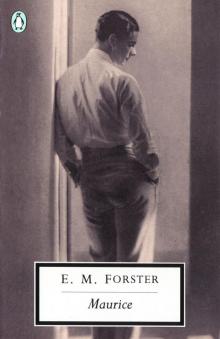 Maurice
Maurice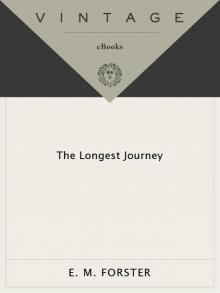 The Longest Journey
The Longest Journey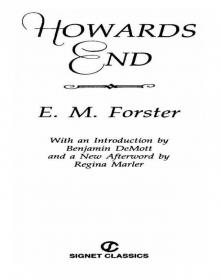 Howards End
Howards End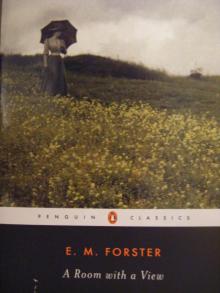 A Room with a View
A Room with a View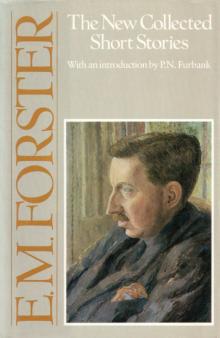 The New Collected Short Stories
The New Collected Short Stories A Passage to India
A Passage to India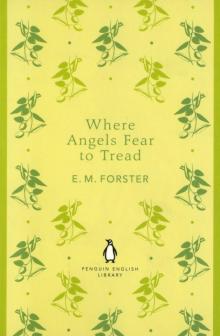 Where Angels Fear to Tread
Where Angels Fear to Tread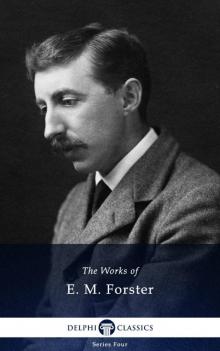 Works of E M Forster
Works of E M Forster Selected Stories
Selected Stories The Machine Stops
The Machine Stops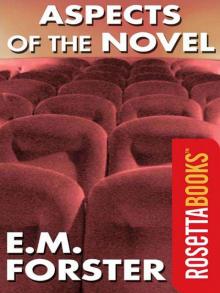 Aspects of the Novel
Aspects of the Novel